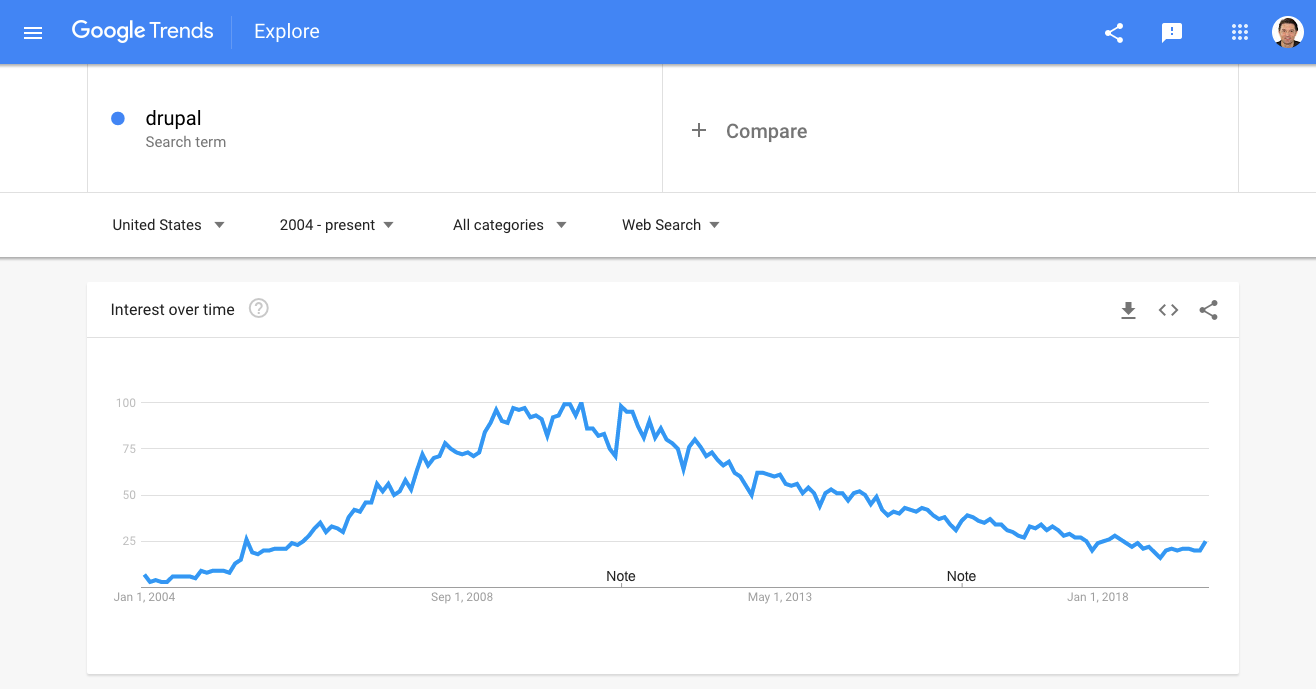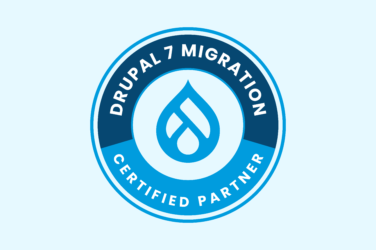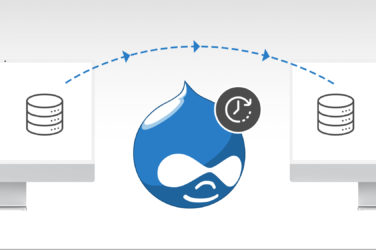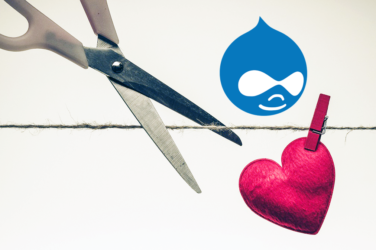As the deadline for migrating out of Drupal 7 (D7) approaches and as the end of life (EOL) for D7 nears, when both Drupal 7 and Drupal 8 support ceases; organizations and agencies need to start thinking about their options.
When does support end for Drupal 7?
The official end of life (EOL) for Drupal 7 has been somewhat of a moving target. Earlier this year, around February 2019, the Drupal organization firmed up the date and, ironically, decided to end support for both D7 and D8 at the same time. As of today, the EOL for D7 AND D8 is November 2021.
This puts organizations in an interesting position. If you are running D7 now and want to migrate, should you migrate to D8 or do you wait for D9 to be mature enough to be released. Right now, there is no choice. D9 is not even available as an option. So, organizations have a very difficult decision to make:
- Should we migrate to D8 now and then migrate again in two years to D9? Migrating is costly and disruptive. Do we really want to do it twice in 2 years?
- Should we hold off, keep maintaining our D7 site, leap frog D8 and jump straight to D9? For proactive organizations that don’t like to wait until the last minute, this is not a good option. Besides, D9 won’t be ready until mid-2020.
- Should we just get out of Drupal altogether and migrate to another CMS like WordPress? This is also a costly option because organizations have probably made a significant investment in Drupal training.
- Should we get out of the CMS completely and migrate to a development framework like Symfony or Django? The problem with this is that a lot of features and functionality that we take for granted with a CMS are not always mature or inherent in a development framework.
What are nonprofit organizations and government agencies running Drupal 7 to do? One thing is for sure … the closer we get to Drupal 7’s end of life, the more agencies will scramble, especially those that waited until the last minute. Yet, there are only a limited number of web development agencies with the skills, capabilities, experience, and capacity to handle a barrage of last-minute migrations.
Don’t underestimate the level of effort for Drupal migration
The biggest mistake organizations can make is to underestimate how much effort may be involved in migrating out of Drupal 7. Consider this…
Last time you redesigned and redeveloped the website into Drupal 7, you probably spent a consider amount of time in that effort. Perhaps it was 3-6 months at an expense of perhaps $175,000-$350,000 (more or less). Then, since you launched it 3-5 years ago, you have spent tens of thousands, if not hundreds of thousands, if not a million dollars, maintaining and enhancing it.
Migrating from Drupal 7 to Drupal 8 is very much like redesigning and redeveloping a website from scratch. All of the effort that went into the initial D7 effort plus all of the enhancements you have made since deploying in Drupal 7 need to be done all over again. On top of that, you need to migrate content and perform extensive quality assurance to ensure that things that were working before the migration work after the migration.
Migration out of D7 into D8 could be double or triple the cost of getting into D7 in the first place.
What about moving to WordPress instead?
It’s interesting because when the WhiteHouse.gov converted to Drupal back in 2009 under the Obama administration, it was a huge win for both Drupal and the Open Source community. Drupal had already been making significant strides since 2004 as can be seen on Google.com/trends.

But Drupal earned well-deserved recognition and kudos after it was announced that WhiteHouse.gov was powered by Drupal. But here is the interesting thing that hasn’t gotten a lot of attention. At the end of December 2017, WhiteHouse.gov was quietly relaunched in WordPress.
The White House claims that the move from Drupal to WordPress is saving American taxpayers over $3M per year, which implies that the Drupal contractor previously responsible for maintaining WhiteHouse.gov was charging the government well over $3M/year for that service. I’m sure the WordPress contractors are charging the Office of Management and Budget (OMB) or the General Services Administration (GSA) several hundred thousand, if not two to three million dollars per year to maintain and secure the WordPress website, but according to the WhiteHouse, whatever they are paying now for WordPress is about $3M less than what they were paying for Drupal, per year.
Migrating to WordPress vs Drupal 8
So, when and why would you migrate to WordPress rather than Drupal 8? Several things to consider.
The primary advantage of Drupal is its granular access control and permissions. With WordPress, if you give somebody Editor or Publisher privileges, they pretty much have those privileges across the entire website. If a hacker got in as an Editor or Publisher, they could hack across the entire spectrum. However, with Drupal, you can contain the scope in which somebody has permissions. With Drupal, you can restrict that Editor or Publisher to a single page if you wanted to. This limits the damage that somebody can do.
Another significant advantage to Drupal is its development framework. Many developers build entire applications on top of Drupal. Highly technical developers faced with complex functionality would much prefer to work with Drupal over WordPress given those two options.
So, if containerization of content and restricting access to very specific sections of the website is important to you, then Drupal would be the better choice. Likewise, if you have a lot of forms for people to fill out and a lot of complex functionality that you want people or the website to be able to do then Drupal is probably the better choice. But, if you are primarily publishing pages of content without a lot of complex functionality and you trust your content managers then WordPress is probably fine and will save you a ton of time and money.
Migrating from Drupal 7 to Drupal 8 versus Drupal 9
As of this moment, Drupal 9 will not even be available until probably June 2020. And if past performance is an indicator of future performance then June 2020 might even be optimistic. So, if you plan to get out of Drupal 7 and you want to stay with Drupal then your only choice is Drupal 8 until, at least, June 2020. Even then, do you really want to migrate your mission-critical website to a first version CMS? Probably not. Probably, you want to wait at least 4-6 months after Drupal 9 is released to even start that migration.
If you wait until January 2021 to start the D7 to D9 migration then you are really painting yourself into a corner. You will have less than a year to get everything done and it could take the better part of half a year to get it done. This leaves very little margin for error and delay. It becomes quite risky to consider a leapfrog jump from D7 to D9.
Migrating from Drupal to a non-CMS like Symfony
In some cases, it may make sense to migrate out of a content management system (CMS) completely. Sometimes, you encounter people who are highly skilled in a particular tool. That tool is all they know. So, when you come to them with a problem, they look at the solution through the lens of the tool. That’s how some Drupal developers think.
- Me: My lightbulb burned out. Drupal Developer: Try Drupal.
- Me: My car broke down. Drupal Developer: Try Drupal.
Kidding, of course. But they say a man with a hammer in his hand looks at every problem as a nail. It’s possible that when your website was last build in Drupal, it should have been built in something else. If your website is transactional, has a lot of database things going on, has a lot of data going on, has a lot of highly complex functionality that is not particularly related to content management going on, then perhaps Drupal was not, or is not, the right solution moving forward. Could be that you should use a development framework like Python, Django, PHP, Symfony, Laravel, etc., to do the job.
If you are thinking about moving out of Drupal 7 and need to decide what to do, please give us a call, perhaps we can help.













